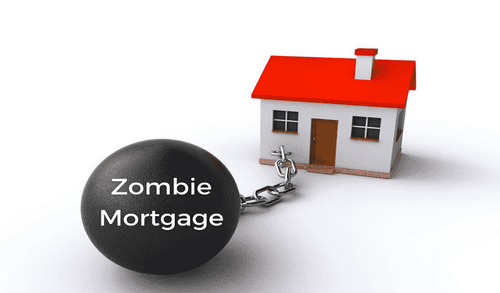A “Zombie Mortgage” is a term used to describe a property that is in foreclosure, but for some reason, the foreclosure process has stalled, leaving the homeowner in limbo. This phenomenon is also known as “zombie foreclosure.”
Zombie mortgages are a problem for both homeowners and lenders. For homeowners, they can be stuck paying for a property they no longer own, unable to move on with their lives or buy a new home. For lenders, zombie mortgages can be a financial burden, as they are left to maintain the property and pay property taxes and other expenses.
So, how do zombie mortgages happen? There are several ways:
1. The homeowner may simply walk away from the property and stop making mortgage payments, assuming that the bank will foreclose and take possession of the property. However, sometimes the foreclosure process can take years, during which time the property becomes a zombie mortgage.
2. The lender may start the foreclosure process, but for some reason, the process stalls. This can happen if the lender is overwhelmed with foreclosures, if there are legal issues that need to be resolved, or if the homeowner files for bankruptcy.
3. In some cases, the lender may simply forget about the property. This can happen if the lender is sold to another bank or if the original lender goes out of business.
Regardless of how it happens, zombie mortgages can be a nightmare for homeowners. They are often stuck paying for a property they can no longer live in or use, unable to sell the property, and unable to move on with their lives. In some cases, they may even be sued by the bank for missed payments or property taxes.
Lenders also suffer from zombie mortgages. They are left to maintain the property, pay property taxes and other expenses, and deal with the legal issues that arise from owning a property that is in foreclosure. This can be a drain on the bank’s resources, and can also lead to legal problems if the bank fails to maintain the property or pay property taxes.
So, what can be done about zombie mortgages? For homeowners, the best course of action is to work with the lender to either modify the loan or negotiate a short sale. This can be a complicated and time-consuming process, but it is often the best way to resolve the issue.
For lenders, the best course of action is to stay on top of their foreclosures and make sure that the process is moving forward. This may require hiring additional staff or outsourcing some of the work to a third-party vendor. Lenders can also work with homeowners to modify the loan or negotiate a short sale, which can help to reduce the number of zombie mortgages in their portfolio.
In conclusion, zombie mortgages are a problem for both homeowners and lenders. They can be caused by a variety of factors, including homeowner abandonment, legal issues, and lender oversight. The best way to deal with zombie mortgages is to work with the lender to modify the loan or negotiate a short sale. This can be a difficult and time-consuming process, but it is often the best way to resolve the issue and move on with your life.

